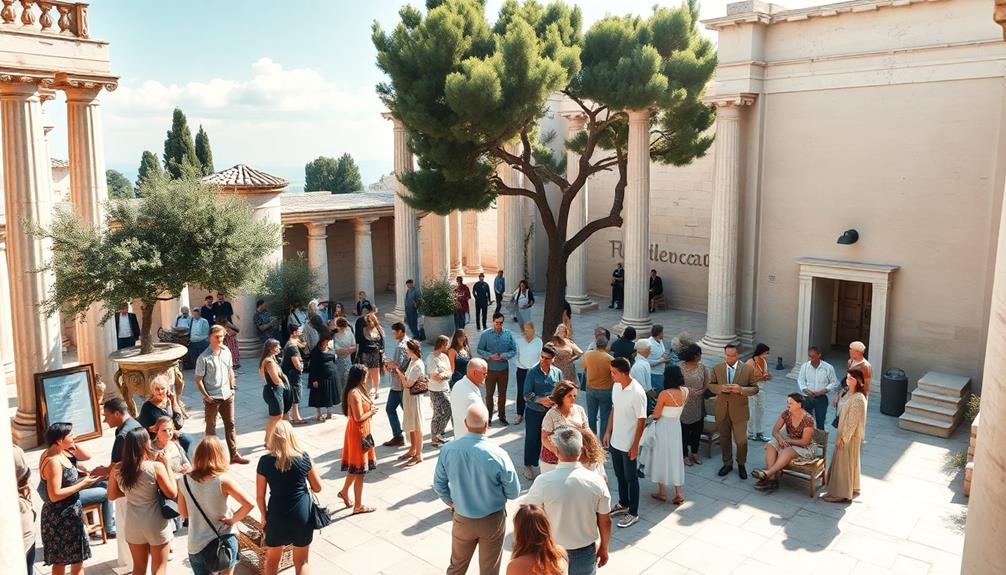Ancient Greece offers powerful lessons that can transform your thinking and life. You'll discover that happiness stems from virtue and self-knowledge, as emphasized by Socrates and Aristotle. Embrace change as an opportunity for personal growth, a core belief in Stoic philosophy. Travel broadens your perspective and nurtures connections with others. Prioritizing clear goals and effective time management leads to fulfillment. Leverage collective intelligence by collaborating and engaging in open dialogue. Finally, nurture your relationship with nature to enhance well-being. If you want to uncover more profound insights, keep exploring these ancient teachings and their modern applications.
Key Takeaways
- Embrace eudaimonia by aligning your life with virtue and purpose for true happiness and fulfillment.
- Utilize Socratic self-reflection to deepen your understanding and broaden your perspectives through critical dialogue.
- Recognize the inevitability of change; view challenges as opportunities for personal growth and evolution.
- Engage in travel to enhance self-awareness, build resilience, and foster meaningful connections with diverse cultures.
- Prioritize emotional intelligence and clear goal setting to guide effective decision-making and enhance interpersonal relationships.
Understanding Happiness

While many people today equate happiness with fleeting pleasures, ancient Greek philosophers understood it as something much deeper. They defined happiness, or eudaimonia, as a flourishing life rooted in virtue and purpose.
Socrates believed that true happiness springs from self-knowledge and virtue, suggesting that understanding yourself is key to a fulfilling life. He argued that all virtues are forms of knowledge, and without this awareness, you can't achieve genuine happiness. This aligns with the notion that maintaining high vibrational energy, as discussed by Abraham Hicks on Sleep and Dreams, can enhance your overall well-being and sense of fulfillment.
Aristotle took this further, claiming that happiness is the ultimate goal of human existence. He emphasized that cultivating virtue through ethical living is essential, as outlined in his "Nicomachean Ethics." For Aristotle, living virtuously leads to a richer, more meaningful life.
The Stoics, on the other hand, taught that happiness comes from within. They stressed that your responses to external circumstances determine your emotional state, advocating for self-control and acceptance of life's challenges.
Additionally, ancient Greeks recognized the importance of social relationships. Aristotelian ethics highlighted friendships based on virtue as crucial for personal well-being, reinforcing that happiness isn't just an individual pursuit but a shared experience rooted in meaningful connections.
Embracing Change

Change is an inevitable part of life, and ancient Greek philosophers recognized its significance as a catalyst for personal growth. Embracing change allows you to navigate life's complexities with resilience. The Stoics taught that while you can't control external circumstances, you can control how you respond to them. This mindset empowers you to see challenges as opportunities for self-discovery.
Socrates emphasized self-reflection, encouraging you to engage in critical dialogue to uncover deeper truths about yourself. When you embrace change, you take a step towards enlightenment, much like Plato's allegory of the cave illustrates. As you confront your biases and broaden your perspective, you evolve, gaining a clearer understanding of reality.
Moreover, the ancient Greek concept of eudaimonia—flourishing—reinforces that embracing change is crucial for a meaningful life. Each challenge you face can lead to growth and fulfillment.
The Power of Travel

Travel opens your eyes to new cultures and ideas, making it a powerful pathway for personal growth.
As you explore unfamiliar places, you step out of your comfort zone, enhancing your adaptability and resilience.
Each journey enriches your understanding of the world and deepens your appreciation for the shared human experience.
Cultural Exposure Benefits
Exploring new cultures opens doors to personal growth and self-awareness. When you travel, you immerse yourself in diverse environments, which enhances your understanding of the world and yourself. This cultural exposure not only introduces you to new ideas but also challenges your existing beliefs, fostering a mindset of adaptability and open-mindedness.
You might find that engaging with locals creates meaningful connections, enriching your emotional well-being and paving the way for lasting friendships. These interactions can lead to shared experiences that deepen your understanding of different traditions and practices, shifting your worldview in profound ways.
Moreover, stepping out of your comfort zone during travels builds resilience and confidence, essential traits for tackling life's challenges. Studies show that this exposure can even boost your creativity and problem-solving skills, as varied experiences stimulate cognitive flexibility.
Ultimately, embracing cultural exposure through travel is a transformative journey that promotes personal growth. It's about more than just seeing new places; it's about evolving as a person, gaining new perspectives, and becoming more attuned to the rich tapestry of human experiences that shape our world.
Personal Growth Through Exploration
Countless opportunities for personal growth await you when you embrace the power of travel. The ancient Greeks understood the value of exploration, and you can tap into that wisdom today.
Travel exposes you to diverse cultures and ideas, fostering self-awareness and adaptability. Additionally, as you navigate new experiences, you may encounter top wellness tips that promote your overall health and well-being.
By stepping outside your comfort zone, you cultivate resilience and learn valuable lessons. Here are four ways travel can support your personal growth:
- Cultural Immersion: Engaging with different cultures helps you reflect on your values and beliefs, deepening your understanding of yourself.
- Experiential Learning: Like Epicurus advocated, immersing yourself in new environments enhances your education through sensory interactions.
- Adaptability: Exposure to change encourages you to embrace the unknown, a key tenet of Stoic philosophy.
- Meaningful Connections: Building relationships while traveling offers insights that enrich your life and broaden your perspective.
The Role of Conscience

Conscience plays an essential role in shaping moral reasoning, and the ancient Greeks understood its significance in the pursuit of virtue. Greek philosophers like Socrates and Plato emphasized that true knowledge and rationality guide ethical behavior and decision-making. By reflecting on your conscience, you align your actions with your values, much like Aristotle's concept of practical wisdom (phronesis).
Here's a quick reference to how different Greek philosophies view conscience:
| Philosophy | Key Insight |
|---|---|
| Socratic | True knowledge leads to ethical behavior. |
| Platonic | Rational soul governs desires for moral harmony. |
| Aristotelian | Practical wisdom aligns actions with moral conscience. |
| Stoic | Emphasizes living in accordance with nature and reason. |
| Epicurean | Distinguishes true pleasure from false desires. |
Goal Setting and Planning

Understanding your conscience sets the stage for effective goal setting and planning. Ancient Greek philosophers emphasized clarity in your objectives, enabling you to live a flourishing life. By examining your values, you can lay a solid foundation for your aspirations.
Furthermore, developing emotional intelligence can enhance your interpersonal relationships and decision-making as you pursue your goals, fostering a supportive environment. Emotional intelligence is essential for steering through challenges and building connections along the way.
Here are four key principles to enhance your goal setting and planning:
- Self-Examination: Just as Socrates advocated, reflect on your true values and what matters most to you. This self-awareness will guide your goals.
- Break It Down: Following Aristotle's teachings, divide larger aspirations into manageable steps. This meticulous planning helps you stay on track and reduces overwhelm.
- Align with Purpose: Understand your "telos," or ultimate aim. Confirm your goals align with your deeper purpose, making each action meaningful and fulfilling.
- Visualize Outcomes: Embrace the Stoic practice of anticipating potential challenges. By visualizing outcomes, you prepare for setbacks, fostering resilience and adaptability.
Incorporating these lessons into your goal setting and planning can greatly enhance your ability to achieve your desired outcomes while contributing to your overall well-being.
Balanced Decision-Making

When making decisions, you need to balance your emotional instincts with rational reflection.
Your initial feelings can guide you, but taking a moment to think critically can prevent impulsive mistakes.
Emotional Versus Rational Choices
Balancing emotional instincts with rational analysis can transform your decision-making process into a more effective one.
By recognizing the interplay between emotions and logic, you can make choices that aren't only informed but also aligned with your values.
Ancient philosophical ideas, particularly from moral philosophy, emphasize the importance of both factors in shaping your decisions.
To achieve a balanced approach, consider these four key elements:
- Reflection: Take time to assess your emotional reactions. The Stoics taught that evaluating your instincts can lead to clarity.
- Rationalization: Engage your logical thinking. Analyze the implications of your choices and the reasoning behind them.
- Practical Action: Implement your decisions with confidence. Bold actions, when well-considered, can yield positive results.
- Acknowledgment of Fate: Recognize that some factors are beyond your control. This awareness can help you focus on what you can change.
Assessing Instincts and Reflection
Effective decision-making hinges on your ability to assess your instincts through reflection. Often, your initial emotional responses can cloud judgment, leading to hasty choices. By engaging in self-reflection, you can critically evaluate these instincts, distinguishing between fleeting emotions and rational thought. This process allows you to align your decisions with your core values, much like the teachings of ancient philosophers like Socrates.
Remember, balancing your instincts with rational thinking is essential. Stoic philosophy emphasizes emotional self-control, urging you to pause and reflect before acting. This doesn't mean ignoring your emotions; instead, it calls for understanding their impact on your decisions. By taking the time to assess your instincts, you can make bold choices rooted in clarity rather than confusion.
Incorporating self-reflection into your decision-making process cultivates personal growth. It encourages a deeper understanding of your motivations and the potential consequences of your actions.
When you find the right balance between instinct and reason, you position yourself for favorable outcomes. Embrace this ancient wisdom, and you'll enhance your ability to navigate life's challenges with confidence and clarity.
Harnessing Collective Intelligence

Harnessing collective intelligence can dramatically transform how teams approach problem-solving and innovation. By embracing the principles rooted in Greek thought, you can foster an environment that encourages collaboration and critical dialogue.
This approach not only enhances creativity but also leads to better decision-making.
Here are four key benefits of leveraging collective intelligence:
- Enhanced Creativity: Diverse perspectives lead to innovative solutions that a single individual might overlook.
- Improved Problem-Solving: Collaborative discussions, like those seen in Socratic dialogues, promote deeper understanding and critical thinking.
- Greater Adaptability: Teams that work together can quickly pivot and adjust strategies based on shared insights.
- Increased Engagement: When individuals feel their contributions matter, it boosts morale and commitment to team goals.
Importance of Time Management

Time management's importance can't be overstated when it comes to maximizing your productivity and achieving your goals. By prioritizing tasks and allocating resources efficiently, you can make considerable progress in your endeavors. Ancient thinkers like Aristotle highlighted the value of structured planning, which enhances your decision-making and clarity in time-related choices.
One effective strategy is breaking down larger goals into smaller, actionable steps. This approach, rooted in ancient philosophy, helps maintain your focus and motivation over time. Modern research backs this up, showing that techniques like prioritization and scheduling meaningfully improve your overall effectiveness.
Here's a quick breakdown of important ideas related to time management:
| Time Management Techniques | Benefits |
|---|---|
| Prioritization | Focuses energy on what's essential |
| Scheduling | Organizes tasks systematically |
| Reflection | Enhances decision-making |
| Goal Breakdown | Keeps motivation high |
| Proactive Planning | Anticipates challenges |
Building Social Relationships

Maximizing your productivity through time management paves the way for another significant aspect of life: building social relationships.
Ancient Greek philosophers understood that the foundation of meaningful friendships is rooted in virtue. These connections enrich your life and promote personal growth.
To cultivate strong social bonds, consider these key ideas:
- Prioritize Virtuous Friendships: Focus on relationships that encourage mutual growth and understanding, as Aristotle highlighted. These are the friendships that lead to a flourishing life.
- Engage in Open Dialogue: Embrace Socratic methods of conversation. Sharing ideas fosters deeper connections and promotes collaborative thinking.
- Strengthen Familial Ties: Nurturing relationships with family and loved ones offers essential emotional support and happiness, which are critical to your well-being.
- Participate in Community Events: Engage in social gatherings that promote collaboration. This not only bolsters individual growth but also enhances collective intelligence.
Connection With Nature

Connecting with nature is essential for your well-being and personal growth. Ancient Greek philosophers understood this crucial connection, emphasizing outdoor learning and interaction with the environment. They believed that immersing yourself in nature fosters self-awareness and enhances your personal development.
Epicurus highlighted the joy of simple pleasures found in nature, advocating for a lifestyle focused on companionship and tranquility. By embracing nature, you can cultivate a sense of peace that supports your mental health.
The Greeks practiced embodied learning, which underscores the importance of sensory experiences in meaningful education. Learning in natural settings, like Aristotle's Lyceum, allowed students to connect more deeply with their surroundings, enriching their educational experience.
Research backs this up, showing that spending time in nature improves mental well-being. It helps you prioritize what truly matters in life, promoting happiness and fulfillment.
So, step outside, breathe in the fresh air, and let nature inspire you. Whether it's a walk in the park or simply sitting under a tree, these moments can transform your thinking and enhance your overall well-being.
Embrace the ancient wisdom of connecting with nature for a more balanced and fulfilling life.
Frequently Asked Questions
How Did the Ancient Greeks Change the Way We Think?
The ancient Greeks changed the way you think by emphasizing dialogue, questioning, and reason. They encouraged you to explore deeper truths, understand human behavior, and pursue virtue, shaping your perception of knowledge and reality.
What Can We Learn From the Greek Thought?
Imagine a flame illuminating your path; Greek thought teaches you to nurture critical thinking, balance emotions, and value relationships. Embrace virtue and resilience, letting their wisdom guide you toward a flourishing, meaningful life.
What Can We Learn From the Ancient Greeks?
You can learn the value of self-examination, the pursuit of true knowledge, and the importance of cultivating virtue. Embracing resilience and seeking simple pleasures can help you navigate life's challenges and find fulfillment.
What Was the Ancient Greek Way of Thinking?
The ancient Greek way of thinking emphasizes reason, virtue, and the pursuit of a meaningful life. You'll find wisdom in questioning assumptions, seeking deeper truths, and understanding that true knowledge transcends mere sensory experiences.
Conclusion
By embracing these timeless lessons from ancient Greece, you can transform your mindset and enhance your life. Did you know that studies show people who travel often report higher levels of happiness, with a 7% increase in life satisfaction for each trip taken? This highlights how stepping out of your comfort zone can lead to profound personal growth. So, whether it's through travel, goal setting, or nurturing relationships, take these insights to heart and watch your life flourish.









